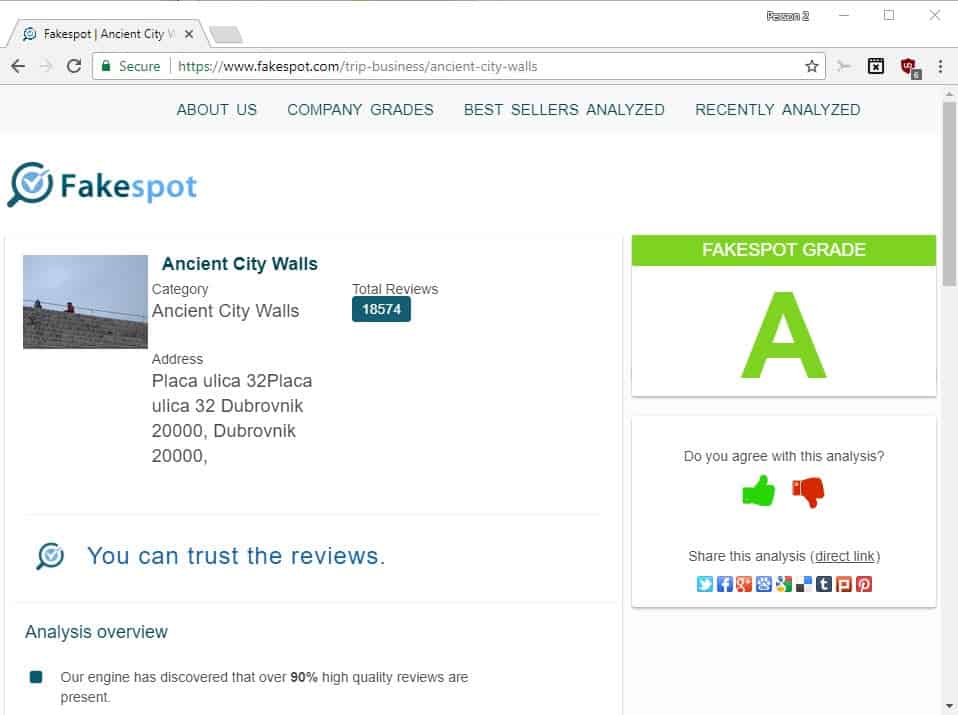Fakespot: uncover fake reviews on Amazon, Yelp and Tripadvisor

Fakespot is a free online service that helps you uncover fake reviews on Amazon, Yelp, and Tripadvisor by analyzing reviews and grading them.
Most shopping, travel and business listing sites support user reviews. Reviews are designed to assist Internet users in making decisions. Should you eat in restaurant A or B, or buy that motherboard or another one.
One of the big issues with reviews is that anyone can leave them. This opens the door for fake reviews, especially since companies tend to favor products with good reviews over products with fewer or less good ratings.
Fakespot
It is sometimes difficult to spot fake reviews as a user as you have a limit amount of information available. You get a username, date and the review text. Some sites link to reviewer profiles on top of that.
You cannot trust the overall rating blindly and need to go through reviews manually to decide on a review by review basis whether it is legitimate or fake.
Fakespot assists you in that. It works by pasting an URL of an Amazon product page, Yelp or TripAdvisor business page in the form on the Fakespot website and selecting analyze afterward.
Results are displayed immediately if the URL is already in the Fakespot database, or analyzed on the fly if it is not.
Fakespot gives an overall rating from A to F, an overview of the analysis, a summary of reviews, and a list of unreliable reviewers.
The grade defines the percentage of reliable reviews and reviewers. Grade A product reviews are 90% or more reliable, Grade F product reviews up to 44% reliable only.
Fakespot's analysis of reviews uses multiple data points that manual reviewers have a hard time getting their hands on. On Amazon, for example, it takes into account verified purchases, date and content correlations, purchasing patterns, and writing style among others.
The primary criteria is the language utilized by the reviewer, the profile of the reviewer,correlation with other reviewers data and machine learning algorithm that focuses on improving itself by detecting fraudulent reviews.
The technologies include: profile clusters, sentiment analysis, cluster correlation and artificial intelligence intertwined with these functionalities.
Fakespot supports select Amazon sites only at the time of writing. The supported sites are Amazon.com, Amazon.co.uk, Amazon.ca, Amazon.com.au, and Amazon.in. All Vine and Discount Disclaimer reviews are considered unreliable by the service.
Closing Words
Fakespot is a handy service to get a first impression of the quality of reviews of a product on Amazon, Yelp, or TripAdvisor. I suggest you use it as a tool to get a quick reading on the quality of reviews of a product or business, but don't use it exclusively. You may want to check reviews manually as well, at least some, to verify the claim that Fakespot makes.
Now Read: Analyze Amazon reviews for authenticity
























Fakespot is nonsense!!!
I have been using Fakespot for a long while thinking it was reliable. However, it is total garbage. I noticed that they also review Yelps posts so I plugged in my friend and neighbors appliance repair business and was surprised to see they gave it the lowest rating possible. Well, I sometimes go with him just to get out of the house, I am retired, and sometimes to give him a hand when a job requires 2 people to move a washer or dryer or wall oven. So I am familiar with his business as well as some of his customers. And I can tell you that I was present when he fixed several of the machines and the customers told us they would post a review on Yelp and they did. they posted excellent reviews. I know they were real and truthful. And yes, some of them went overboard in their reviews but they were honest and legit. but Fakespot said they were false and gave a load of reasons why. Fakespot is just a load of manure.
Bottom line is read the reviews carefully and look for comments that really describe using the item. See if they make sense to you and go with that. And especially see if the reviews were all posted within minutes or hours or just a few days. In my opinion genuine reviews just trickle in,
like my neighbor who has 25 reviews on Yelp over a 5 year period.
And take a look at the product reviews on Youtube to actually see whatever it is in use. That way you will have a really good and informed idea before buying.
And forget about Fakespot! It’s just another internet joke.
A lot of super positive reviews are usually fake. people normally leave reviews when there is a problem.
I’ve used Fakespot for a while. It does seem to work as advertised.
There is one small flaw though. It only checks a product page once, so any changes like new reviews, removed reviews, etc. are not taken into account. Though it will warn you if the metareview is “old.” However, I don’t know how old is old. That said, you can ask it to re-review the item and get updated information. In some cases a product’s analysis has gotten worse, while in others I’ve seen an improved grading.
I used fakespot a few times from people at slickdeals, not really accurate imo. I bough a few thing that I like and still use and they got a C/D score on fakespot. Someone do a review of fakespot review reviews. Wouldn’t that be meta?
@Jeff: “Amazon reviews usually have a “Verified purchase” for this, don’t they?”
Yes, but that is not an obstacle to phony review’s coming from seller’s and their agents. Purchased items can be returned after a favorable review and sellers can directly pay people to buy their merchandise & post a favorable review.
Also, the high number of phony reviews indicates there must be some technical hack in play that permits spoofing of “verified purchase”.
Most Amazon reviews are phony or exaggerated positive reviews. The frequent use of superlative adjectives on ordinary merchandise betrays the boiler-room operators who are hired to generate positive reviews by the thousands. Negative reviews are generally more honest & helpful — but they are vastly outnumbered by the phony stuff.
Third-Party web sites are helpful in reviewing the reviews — but usually do not provide any definitive conclusions on the review-validity of a specific Amazon item. Best to get other reviews of an Amazon item from a Google query, if possible.
Amazon reviews usually have a “Verified purchase” for this, don’t they?
I like and use Fakespot, but I prefer https://reviewmeta.com.
I bought a product recently on Amazon that ended up being “ok” at best. Only afterwards did I even think of investigating into the reviews. There I discovered some red flags. Fakespot would have saved me a bit of trouble if I had known about it first. Turns out what I bought had a Fakespot review rating of a “D”. A far cry from the 4 1/2 stars Amazon had! Live and learn.
So now we have reviews of fake reviews. Where does the silliness end?
” I suggest you use it as a tool to get a quick reading on the quality of reviews of a product or business, but don’t use it exclusively. You may want to check reviews manually as well, at least some, to verify the claim that Fakespot makes.”
We should review the reviews of the fake reviews but not only that we should manually review the reviews of the fake reviews to evaluate if the fake reviews are real fake reviews and not fake fake reviews made up by fakespot.
Did I get that right?
Anyway now the moderator has to review my comment
The ultimate would be of course to have fake comments about genuine reviews of fake reviews.
The worst reviews, fake or not, are those which check a rating and lack arguments.
Fake, everywhere, fake news, fake reviews, fake fake fake. So anything, any concept, any tool such as Fakespot is welcomed, even if the alternative to a fake review could be an erroneous analysis.
I guess most of us mix the information with their rational analysis and fill the remaining gap of incertitude with their home-made intuition. It’s a lottery at the end.
It won’t end when $$$ is involved.